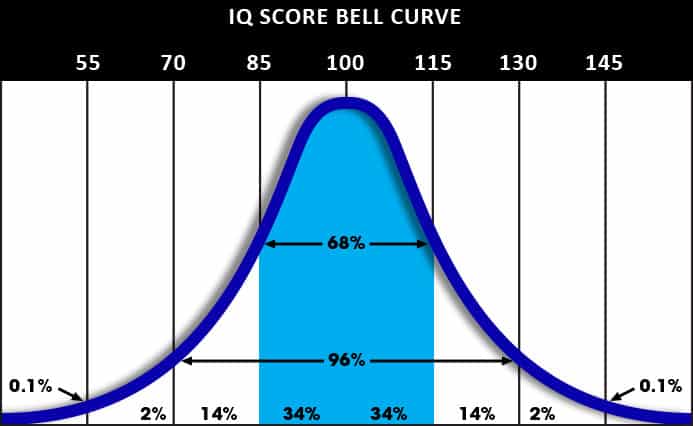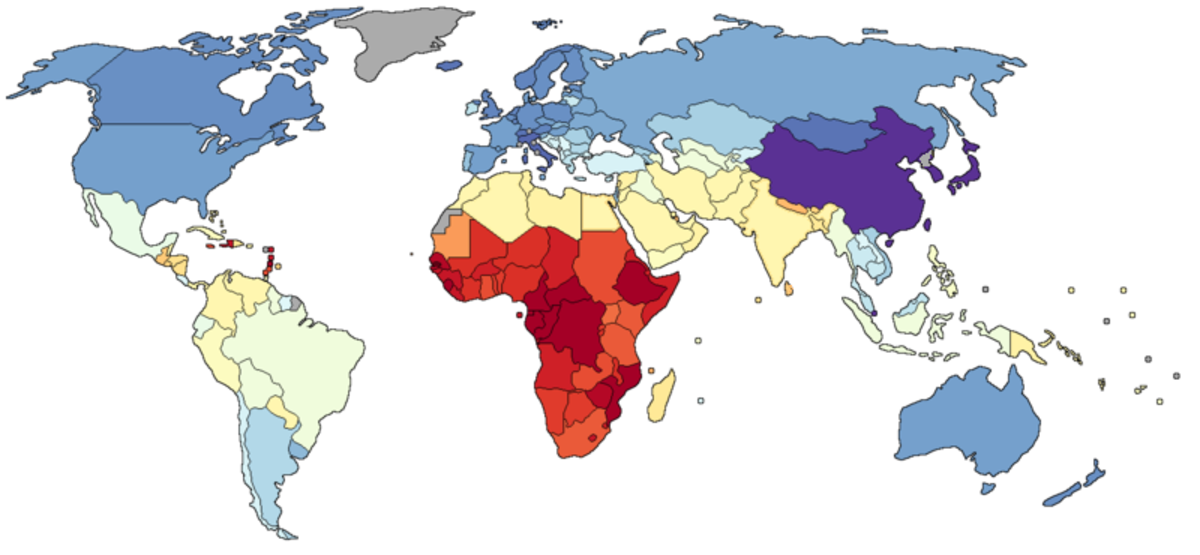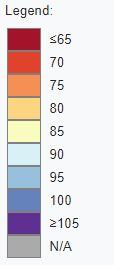IQ tests have been around for decades and they continue to stir up controversy and intrigue about human intelligence. For people who have taken an IQ test, many do so to answer the question, Do I have an above average IQ?” However, to answer that question, you must first answer the question, “What is an average IQ?”
Understanding what the average IQ is for human beings is a more complex subject than it might appear on the surface. In fact, some say that many classic IQ tests are so biased and discriminatory by nature that they ought to be scrapped entirely. We’ll explore some of these controversial topics below.
Different types of IQ tests
If you’re new to the subject of IQ tests, you might be surprised to know just how many iterations there are. There are stark differences between many of these tests, with some aiming to account for chronological age, while others focus on problem solving independent of cultural or linguistic biases, all of them are designed to measure a person’s intelligence quotient, or IQ. Currently, all of the following tests are used to measure IQ.
- Wechsler Adult Intelligence Scale
- Wechsler Intelligence Scale for Children
- Woodcock–Johnson Tests of Cognitive Abilities
- Raven’s Progressive Matrices
- Stanford–Binet Intelligence Scale
- Das–Naglieri Cognitive Assessment System
- Cattell Culture Fair III
- Reynolds Intellectual Assessment Scales
- Thurstone’s Primary Mental Abilities
- Kaufman Brief Intelligence Test
- Differential Ability Scales
- Multidimensional Aptitude Battery II
You can click on the links to learn more about each individual test, but the most popular tests used today by psychologists and prominent high IQ societies like Mensa include the Wechsler tests, the Cattell Culture Fair test and the Stanford-Binet test.
So, what is an average IQ?
The reason we listed off the variations of IQ tests before answering this question is that the IQ scoring scale can vary from test to test. Among the most popular tests, the Wechsler, Cattell and Stanford-Binet tests, the average IQ is designed to be a score of 100. While a score of 100 would make you perfectly average, in general, a score within 90-110 is seen as average.
These tests are created so that the scores fall along a standard distribution, or bell curve, where the majority of scores cluster around the middle and become fewer and fewer the farther away you get from the average. The bell curve below illustrates the scoring curve for the Wechsler test.

Average IQ test scores by country
When you think of looking at the average IQ you probably want to first compare the average IQ scores of people from different countries. This might seem like a quick and easy way to figure out which regions have the smartest people in the world. This can and will be disputed by some, but the quick breakdown of it looks like this:
- Hong Kong: 108
- Singapore: 108
- South Korea: 106
Then towards the bottom of the list, you have countries such as:
- Mozambique: 64
- Saint Lucia: 62
- Equatorial Guinea: 59


By WD RIK NEW at the English Wikipedia, CC BY-SA 3.0, Link
Clearly, when demographic factors and race get tossed into a discussion, things have the tendency to get controversial, but there is a lot to unpack from these types of numbers in terms of the tests themselves and the nature of intelligence and IQ testing.
Nature vs. nurture
It can quickly get pretty disturbing when some people take average IQ score data out of context and begin to believe that certain races are simply genetically superior to others. Unfortunately, there are people who use some of these test scores to justify this line of thinking. Despite the fact that many people take this line of thinking, there has been no scientific link found between genetics related to race and intelligence. Much more evidence has surfaced that nurture plays a big role in how someone does on the test. Another factor that can influence test scores is life experiences. Some of the questions on the test are presented in such a way that some people may not know the answers simply because their life experiences have not exposed them to the subject matter. So, for example, if a person has never had a mortgage or does not understand what one is based on where they live, a question on that topic can be more difficult than it is for someone familiar with what a mortgage is.
It’s simply a fact that IQ tests have most frequently been created by white men from certain regions of the world, namely Western Europe and the United States. Not surprisingly, these tests are standardized to the experiences of their creators. If you are not a part of that sex or race, then you may have trouble understanding some of what is being asked of you on the test. In effect, you could be penalized on your score for simply not having had the same life experiences as others. These are some of the frequent critiques of popular versions of the IQ test. However, this has also led to some innovations in testing and the rise of other tests which try to measure intelligence while avoiding cultural bias, like the Cattell Culture Fair IQ test.
IQ by gender: average female IQ vs. average male IQ
The interesting answer here is that the average adult IQ is nearly identical for males and females. While there has been plenty of banter and discussion over the years as to which sex has the upper hand in terms of intelligence, it turns out that the average human IQ doesn’t discriminate in terms of gender. One thing worth noting here is that the IQ results for both men and women have risen in the last few decades, but the scores for women have been rising at a faster rate than for men.
What does IQ measure?
When IQ tests were first conceived and implemented by French psychologist Alfred Binet, they were used to calculate what he called “mental age”. Essentially, it was a test to measure the intelligence level of children by age group. Since then, the tests have become more sophisticated. Now, the goal is to gain a rounded understanding of human intelligence including a person’s ability to use logic, process verbal and visual information, their spatial awareness, and their ability to use verbal reason. Other terms used as descriptors for what IQ tests measure include crystallized and fluid intelligence.
What IQ score is required to be a genius?
To be seen as a person with genius IQ, usually someone must achieve a score nearing three standard deviations above the average IQ. Typically a score of 140 to 145 on a test such as the Wechsler would be the cutoff for being termed a genius. However, many tests become unreliable at scores this high, and must be proctored by someone with unique experience and training to make sure the score is measured correctly.
Believe it or not, but what constitutes above average or gifted intelligence today may well have been seen as genius level intelligence in the past. That’s because human intelligence continues to increase. In what’s been termed the Flynn effect, from the researcher who discovered it, since the 1930s we’ve seen an improvement in people’s ability to problem solve, use logic and think abstractly. As such, IQ tests have had to adjust and become more difficult to maintain an average IQ score of 100.
